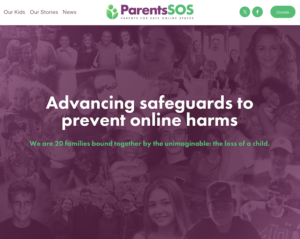 While the benefit of technology is obvious, inherent risks of technology overuse by young children are unrecognized and largely ignored. The virtual world is devoid of touch, movement, human connection, and nature – four critical elements for child development and learning. One in three children now enter school developmentally delayed, one in four are obese, one in six have a diagnosed mental illness, and one in ten are addicted to video games and/or pornography. Child aggression and sexual violence is problematic, resulting in some countries restricting access to video games and pornography e.g. Iceland proposing a ban on internet porn. Sedentary, isolated, overstimulated, and neglected, the new millennium child is struggling to survive, and child sustainability is now in question. Health and education professionals are positioned to provide early detection and intervention for children and families struggling with technology addiction. This article is designed to offer helpful tools for professionals to help with early identification and treatment of family technology addictions.
While the benefit of technology is obvious, inherent risks of technology overuse by young children are unrecognized and largely ignored. The virtual world is devoid of touch, movement, human connection, and nature – four critical elements for child development and learning. One in three children now enter school developmentally delayed, one in four are obese, one in six have a diagnosed mental illness, and one in ten are addicted to video games and/or pornography. Child aggression and sexual violence is problematic, resulting in some countries restricting access to video games and pornography e.g. Iceland proposing a ban on internet porn. Sedentary, isolated, overstimulated, and neglected, the new millennium child is struggling to survive, and child sustainability is now in question. Health and education professionals are positioned to provide early detection and intervention for children and families struggling with technology addiction. This article is designed to offer helpful tools for professionals to help with early identification and treatment of family technology addictions.
Babies with iphones, toddlers with ipads, and children immersed in porn and violence, are now a socially acceptable norm. Computers imbedded in glasses and windshields are now available. Many parents are addicted to technology themselves, and consequently use technology as a soother to entertain upset and lonely children. Detached children are attaching to devices in droves, fueling escalating addictions, and resulting in behaviors which are readily diagnosed as mental illness and medicated. Self-regulation, or the ability to self soothe without a device, while a known determinant for social and academic success, becomes unachievable in the presence of addiction. As brain development is concordant with environmental stimuli, overstimulation from technology prunes tracks to frontal cortex, causing attention deficit, poor impulse control, and inability to learn. Without any evidence to support technology educates as opposed to just entertains, many parents and teachers conveniently believe these devices are educational, further supporting escalating usage.
Early detection and intervention for child and family technology overuse is a growing field for health and education professionals. This article provides four links to useful tools to assist with what appears to be a daunting task, addressing prevalent and rapidly escalating child and family technology addictions. Assisting families in reducing their usage of technology requires initial groundwork in the area of family reconnection and identification of healthy activities, which indirectly address addiction. Pediatric occupational therapists are experienced in the use of play to enhance development and learning, and are experienced in promoting attachment, and can consequently assist health and education professionals in early detection and treatment of child and family technology addictions. Stuart Brown, author of “Play – How it shapes the brain, opens the imagination, and invigorates the soul” reports that the opposite of play is depression, and that parent: child attachment and trust is established through play. Going outside to play can reverse the effects of technology overuse in children and their families.
Following are four “Tech Tools” to help families manage balance between technology and healthy activity:
Technology Screen – used as an essential component in health and education assessments to determine baseline technology usage rates. This screen incorporates research findings that many parents don’t really know how much technology their children use, as is so difficult to manage transportable devices.
Ten Steps to Unplug – guide to assist families along the path toward reducing technology usage.
Technology Schedule – encourages parents and children to negotiate and schedule balanced use of technology and healthy activities.
Tech Diet – unplug challenge to reset family values, interests, and activities. Cris Rowan is available to come to your community, school, or health center for health and education professional trainings in early detection and intervention for child and family technology addictions.
Cris can be reached at info@zonein.ca or 1-888-8zonein. Additional information can be found on her website www.zonein.ca.





2 Responses
phones are a very innovative to the learning experience, allowing kids to be able to access information with out having to dig through a library. Phones can also store books on them so students do not have to carry around multiple heavy objects.
Credit https://www.change.org/p/seattle-public-schools-unban-phones-from-seattle-public-schools-6ef7b7f3-497d-4398-86d8-cad092f60ba1
Hi there I was writing to see if you would be able to email me a flier that you have entitled ” .10 Reasons Why Handheld Devices Should Be Banned for Children Under the Age of 12 “. I was looking for a flyer for it to download but could not find it. If you would be able to I would appreciate it.
Thanks